Welcome to Trail Guide, your host through the wilds of the 2016 presidential campaign. It’s Sunday, Jan. 17, and here’s what we’re talking about:
- Bernie Sanders and Hillary Clinton went after each other almost immediately at the Democratic debate, starting with guns and healthcare
- Sanders, Clinton and Martin O’Malley each laid out what their first 100 days in the White House would look like
- Sanders was under pressure from Clinton to detail his health plan, and he released it right before the debate
- Here’s what Hillary Clinton says Bill Clinton’s role would be in her White House
- Marco Rubio wades into the “New York values” debate
- Clinton deploys Bill to win over voters in Iowa
- Donald Trump and Ted Cruz join in criticizing the U.S. prisoner swap with Iran
What would be the role of Bill Clinton in a Hillary Clinton administration?
Hillary Clinton has hinted that should she win the 2016 presidential race, her husband, former President Clinton, could have a role in her administration.
“It will start at the kitchen table. We will see how it goes from there,” Clinton said in Sunday night’s debate, drawing a loud applause.
“When it comes to the economy and what was accomplished under my husband’s leadership in the ‘90s ... you bet I’m going to ask for his leadership. I’m going to ask for his advice and I’m going to use him as a goodwill emissary to go around the country,” she added.
Bill Clinton, whose poll numbers remain positive with the American electorate, has hit the trail in recent weeks to campaign for his wife in the early nominating states of Iowa and New Hampshire.
Bernie Sanders would rather just focus on the issues
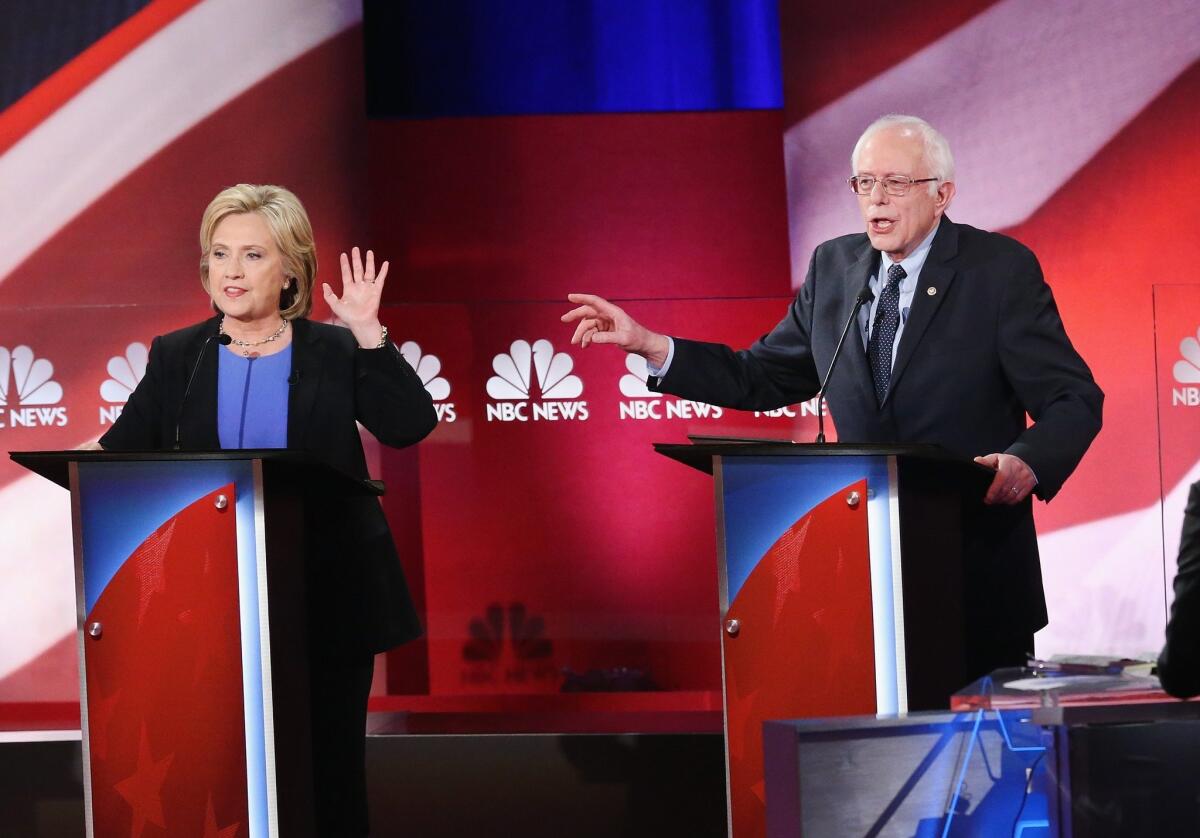
Pressed on Sunday night to complain about former President Clinton’s extramarital affairs while commander in chief, Bernie Sanders instead pivoted to grouse about the media and label the inquiry all but a “gotcha” question.
“I cannot walk down the street without being told how much I have to attack Hillary,” he said. He called Bill Clinton’s behavior “deplorable,” but said he was committed to debating Hillary Clinton on the issues.
It’s not the first time Sanders has criticized campaign coverage. He’s been complaining since the beginning of his White House run:
Democrats want more to be done on climate change
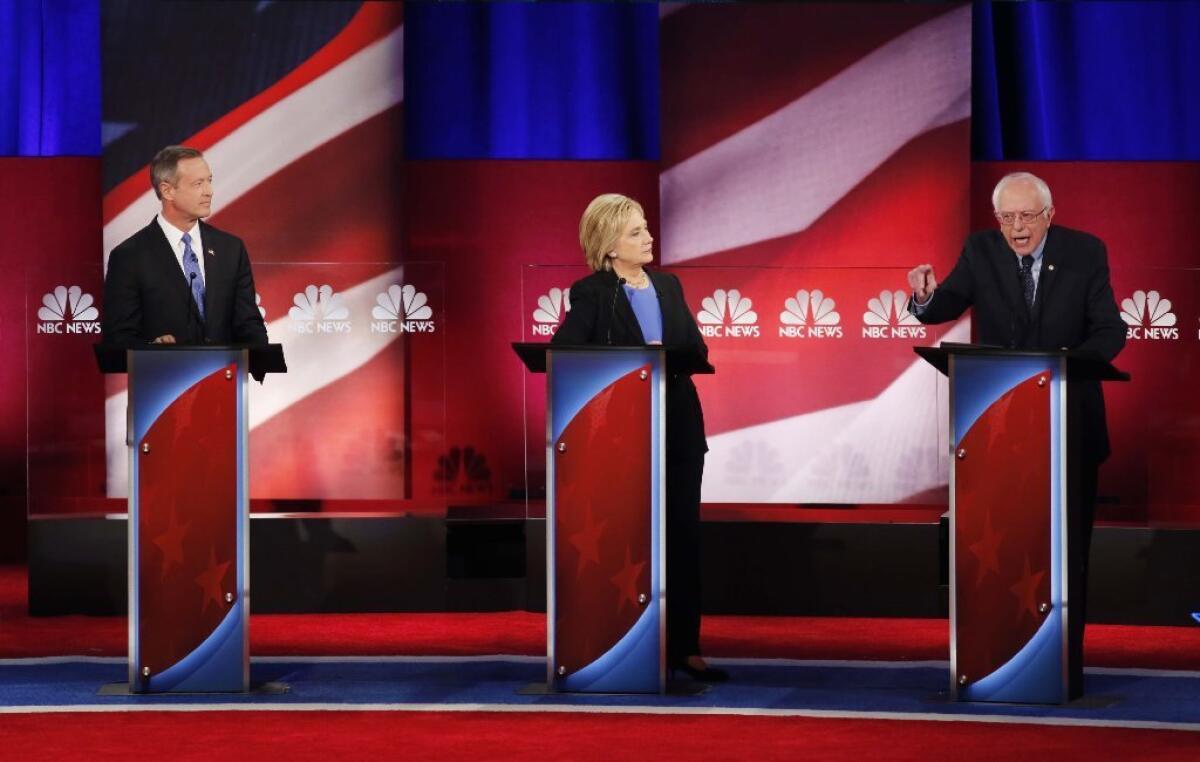
For Republicans including front-runner Donald Trump, climate change is nothing more than a hoax. But for the Democratic presidential hopefuls onstage Sunday night in South Carolina, the effects of climate change are real.
“I was home in Burlington, Vt., on Christmas Eve. The temperature was 65 degrees. People in Vermont know what’s going on; people who did ice fishing where their ice is no longer there on the lake understand what’s going on,” said Vermont Sen. Bernie Sanders. “The debate is over. Climate change is real.”
He accused Republicans of being “owned by the fossil fuel industry.”
“They don’t even have the courage or decency to listen to the scientists,” Sanders said.
Former Maryland Gov. Martin O’Malley urged his rivals to do more when it comes to combating climate change.
“I would like to challenge and invite my colleagues here on this stage to join me in putting forward a plan to move us to a 100% clean electric energy grid by 2050,” he said.
Why the Democrats are cautioning that the Iran nuclear deal is only a first step
Hillary Clinton and Bernie Sanders both praised the landmark nuclear deal with Iran during Sunday’s debate but cautioned that it does not mean the doors have been thrown wide open on newly close relations with the Islamic republic.
Clinton said the new sanctions that the Obama administration slapped on Iran on Sunday, unrelated to its nuclear program, showed that there are several knotty problems the two countries are staring down as they edge toward a new relationship after decades of acrimony.
“I was responsible for getting those sanctions imposed,” Clinton said, referring to her time as President Obama’s top diplomat.
Here’s what Saturday’s implementation of the nuclear deal means for U.S.-Iran relations and the future of the Middle East:
Bernie Sanders is pressed to explain how he’d pay for the new programs he wants
Hillary Clinton sharpened her long-running attack on Bernie Sanders for championing an agenda that includes tax increases on middle-class families to pay for all the new government programs he is proposing.
“There are serious questions about how we are going to pay for what we want our country to do,” she said. “I am the only candidate standing here tonight who has said I will not raise taxes on the middle class. I want to raise incomes, not taxes.”
Sanders was unrepentant. He said most of the programs he is proposing would be funded through new levies on the wealthy and the financial industry.
“This country and the middle class bailed out Wall Street,” he said. “Now it is Wall Street’s time to help the middle class.”
Both Sanders and Clinton accused each other of not documenting in detail how the funding plan would work. And both insisted that they have provided a full explanation.
But the tax clash was sharpest on the issue of healthcare. The Sanders proposal to provide Medicare-style healthcare to every American would be funded with new taxes, including on the middle class. Sanders said it was disingenuous of the Clinton campaign to suggest this was an onerous burden.
“I am disappointed that Secretary Clinton’s campaign has made this criticism,” he said. “It is a Republican criticism. Secretary Clinton does know a lot about healthcare, and she understands, I believe, that a Medicare-for-all, single-payer program will substantially lower the cost of healthcare for middle-class families.”
He said they would pay a slight increase in taxes, but save more than $5,000 in health insurance costs. “A little bit more in taxes, do away with private health insurance premiums,” he said. “It is a pretty good deal.”
NBC’s Andrea Mitchell, one of the moderators, pressed Sanders on the point, noting that he had vowed earlier in the campaign not to raise taxes on the middle class for anything other than funding a paid family leave program.
“It is not breaking my word,” Sanders said. “It is one thing to say I am raising taxes; it is another thing to say we are doing away with private health insurance premiums. … There are huge savings in what your family is paying.”
Donald Trump really did call climate change an invention of China
That’s what Bernie Sanders charged during Sunday’s debate. And he was right. Trump made the claim in 2012, well before his current run for the White House:
The back-and-forth between Clinton and Sanders on healthcare
During Sunday’s debate, Hillary Clinton targeted Bernie Sanders’ refusal to provide details on how his healthcare plan would be funded until two hours before the debate.
“When talking about healthcare, details really matter and therefore we have been raising questions,” she said. “He didn’t like that, his campaign didn’t like it either and tonight he’s come out with a new plan.”
“The Democratic Party and the United States has worked since Harry Truman to get the Affordable Care Act passed,” Clinton said. “We finally have a path to universal healthcare. We have accomplished so much already. I do not want to see the Republicans repeal it. And I don’t want to see us to start over again with contentious debate. I want us to defend and build on the Affordable Care Act and improve it.”
Sanders counted by pointing out that he helped pass the Affordable Care Act and labeled Clinton’s characterization of his healthcare efforts “nonsense.”
“What a Medicare-for-all program does is finally provide in this country healthcare for every man, woman and child as a right,” Sanders said.
“We are spending far more per person on healthcare than the people of any other country.”
Clinton called the Affordable Care Act “one of the greatest accomplishments of President Obama, of the Democratic Party and of our country. ... There are things we can do to improve it, but to tear it up and start over again, pushing our country into that type of contentious debate, I think is the wrong direction.”
Sanders retorted: “We are not going to tear up the Affordable Care Act. I helped write it. But we are going to move on top of that to a Medicare-for-all system.”
He said the reason the U.S. has not moved in the direction of other major democracies and imposed universal healthcare is because of a corrupt campaign finance system enabling insurance companies and pharmaceutical firms to stop it.
What the leading Democratic candidates would do to combat polarization in the country
In President Obama’s State of the Union address last week, he said his biggest regret was that “rancor and suspicion between the parties has gotten worse instead of better.”
On Sunday, Democratic presidential hopefuls were asked what they would do to reverse that decline in bipartisanship.
“I will go anywhere to meet with anyone at any time to find common ground,” said Hillary Clinton.
While Clinton holds a strong lead nationally in the race to become the party’s nominee, Vermont Sen. Bernie Sanders is polling strong in the early nominating states of Iowa and New Hampshire.
Sanders, who has touted a populist message that hits heavily on income inequality, said partisanship and polarization are at an all-time high because Congress is “owned by big money.”
“We have got to make Congress respond to the needs of the people,” said Sanders.
Here’s what Hillary Clinton and Bernie Sanders are fighting about over healthcare
Although Hillary Clinton and Bernie Sanders both want healthcare for all, they have repeatedly clashed over the best way to reach that goal.
They went at it again during Sunday’s debate, when Sanders defended his vision for a new universal healthcare system.
Sanders has proposed what’s known as a single-payer system, in which the federal government would essentially act as the country’s insurance company. That’s similar to how healthcare works in Canada and some European countries, and the Vermont senator said it will help drive down costs and ensure everyone receives medical coverage.
Sanders had come under fire from Clinton for not releasing more details on how the proposal would work, and how it would be funded -- something he did just hours before Sunday’s debate. The former secretary of State says there’s no way to pay for such an expensive program without raising taxes on the middle class, something she has ruled out.
Clinton also says Sanders is wrong to reopen the healthcare debate after Democrats already successfully enacted the Affordable Care Act, which leaves in place a system of private and employer-sponsored insurance.
“We have accomplished so much already,” she said Sunday. “I do not want to see the Republicans repeal it, and I don’t want to see us start over again with a contentious debate.”
She has called for modest changes to the law, such as lowering the cost of prescription drugs and protecting patients from surprise medical bills.
Sanders rejected Clinton’s claim that he would scrap Obamacare.
“We’re not going to tear up the Affordable Care Act. I helped write it,” he said. “But we are going to move on top of that to a Medicare-for-all system.”
Sanders offers detailed plan on policing, an evolution for his campaign
Vermont Sen. Bernie Sanders was asked during Sunday’s debate how he would address the conflicts between police and civilians that have roiled communities across the country over the last two years and given rise to the Black Lives Matter movement.
Sanders laid out a multi-point plan, calling for automatic federal investigations if a police officer kills someone, and for demilitarizing the look of police forces as well as diversifying their ranks.
It was a detailed proposal that was a far cry from earlier in the campaign, when Sanders was caught flat-footed when interrupted by protesters at a campaign event. The Times’ Kurtis Lee and Evan Halper examined how the Black Lives Matter movement forced the Democratic presidential hopefuls to rethink their platforms:
Bernie Sanders’ record on guns is more complicated than Hillary Clinton is making it out to be
Hillary Clinton has repeatedly criticized Bernie Sanders’ record on guns, one of the rare issues where she finds herself to the left of the Vermont senator.
“He has voted with the NRA, with the gun lobby, numerous times,” Clinton said in Sunday night’s debate, before listing a series of his votes.
As a congressman, Sanders voted against the Brady bill, the landmark background check legislation that President Bill Clinton signed into law in 1993. According to PolitiFact, Sanders voted against various versions of the bill as it weaved its way through Congress, keeping his word to rural voters in Vermont, a state with a strong hunting culture.
More recently, though, Sanders backed gun control measures in the aftermath of the Newtown, Conn., school shooting. He voted for a 2013 amendment to ban assault weapons and another to expand background checks. Both of those measures, however, failed to advance.
Sanders has received failing grades from the National Rifle Assn.
Much of Clinton’s recent criticism has focused on a 2005 vote to provide legal immunity to gun manufacturers and dealers. Sanders has said he’s willing to take a new look at the issue, and on Saturday night he backed legislation that would roll back some of the protections. Clinton said she was “pleased to hear that Sen. Sanders has reversed his position on immunity.”
Sanders defended his previous vote, saying there were “some good provisions” in the 2005 bill, and called Clinton’s attacks “very disingenuous.”
“As a senator from a rural state that has virtually no gun control, I believe that I am in an excellent position to fight for sensible gun legislation,” he said.
Clinton’s team has called it a “debate-eve conversion.”
What Democrats plan to do if they win the presidency
All three candidates were asked what they would do in their first 100 days in the White House. Here’s what they sketched out:
In opening remarks, Democrats invoke Martin Luther King Jr.
Just before debate, Bernie Sanders unveils plan to pay for healthcare
Bernie Sanders has been talking a lot on the campaign trail about the shortcomings of Obamacare, pushing to replace it with a European-style healthcare system. But until Sunday night, he hadn’t explained how he would pay for it.
Under pressure from Hillary Clinton’s campaign, Sanders stepped forward with the list of tax hikes that his health plan would require. Every family earning above $28,800 would pay. Some quite a bit.
The plan would be funded, for the most part, through a new “healthcare premium tax” of 2.2% on income, along with a 6.2% “healthcare payroll tax” to be paid by employers. The new levies join several other tax increases Sanders has planned, most of them targeted at higher earners.
Sanders said the plan would ultimately lead to substantial savings for middle-class Americans, reducing their need for costly private insurance. His campaign projects that average medical care costs for a family earning $50,000 would drop from more than $6,000 to less than $500.
The details were unveiled just two hours before a Democratic debate in which healthcare is likely to be a central issue. Sanders produced the plan as Clinton has accused him of misleading voters about the cost that would be involved in running such a government medical care system.
Ahead of debate, Bernie Sanders works to neutralize Hillary Clinton’s assault on his gun record
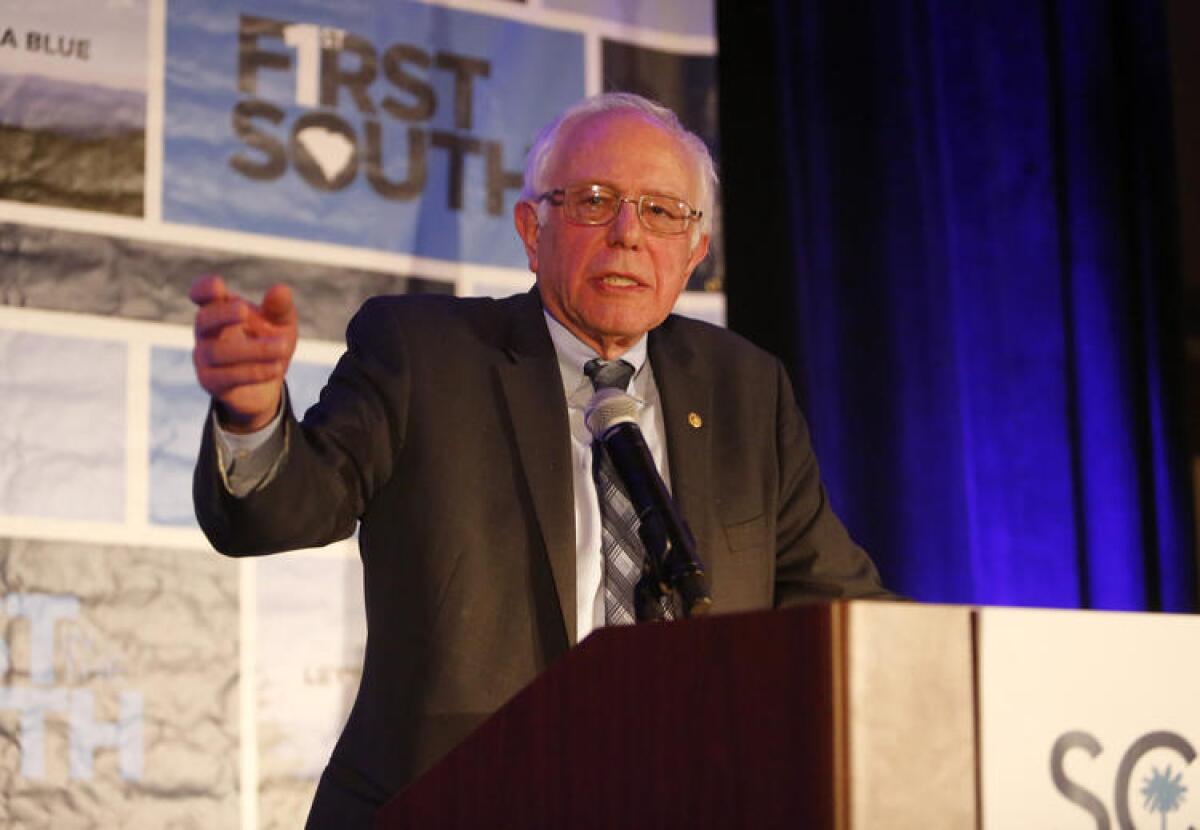
As Hillary Clinton seeks to weaken his upstart bid for the Democratic presidential nomination, Vermont Sen. Bernie Sanders is primed to quell the onslaught of criticism over his record on guns.
While the two offer few major ideological differences, the Clinton campaign has sought to cast Sanders as out of touch with the party on the issue in recent days, ratcheting up its attacks while polls show support for Sanders nearly matching hers in Iowa -- the state that opens the nominating process.
During debates and at town hall-style events, Clinton, the former secretary of State, has repeatedly castigated Sanders for voting in favor of a 2005 law that protects firearms manufacturers and dealers from being held liable when their products are used to commit crimes. Then-Sen. Clinton did not back the proposal.
Hillary Clinton’s campaign to her super PAC: Cool it
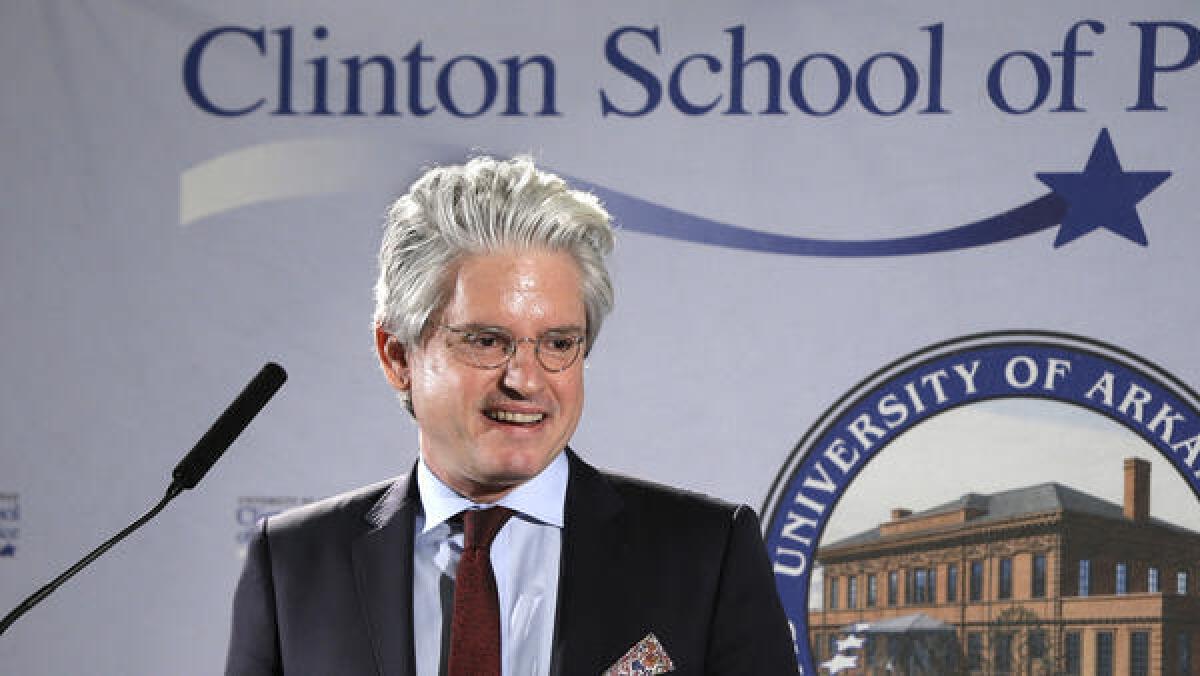
Hillary Clinton’s campaign has made clear it is moving into a new phase of the race, where it will take a far more aggressive posture toward Bernie Sanders – but some in the Clinton camp may be getting overeager.
A super PAC run by top Clinton surrogate David Brock will begin airing advertisements questioning the physical fitness of the 74-year-old Vermont liberal, Politico reported. Brock directs the Correct the Record super PAC and sits on the board of Priorities USA, which is raising tens of millions of dollars to support Clinton.
Brock is a self-described hit man. He is a former journalist who helped lead the right wing’s attacks on Hillary and Bill Clinton in the 1990s, later regretted it, and re-emerged as a staunch Clinton loyalist who now focuses on attacking their opponents (usually, though, the conservative ones) and raising money for Hillary Clinton.
But Clinton’s campaign chairman was not pleased by the news that Correct the Record was about to unleash an attack on Sanders’ health:
Marco Rubio wades into ‘New York values’ debate
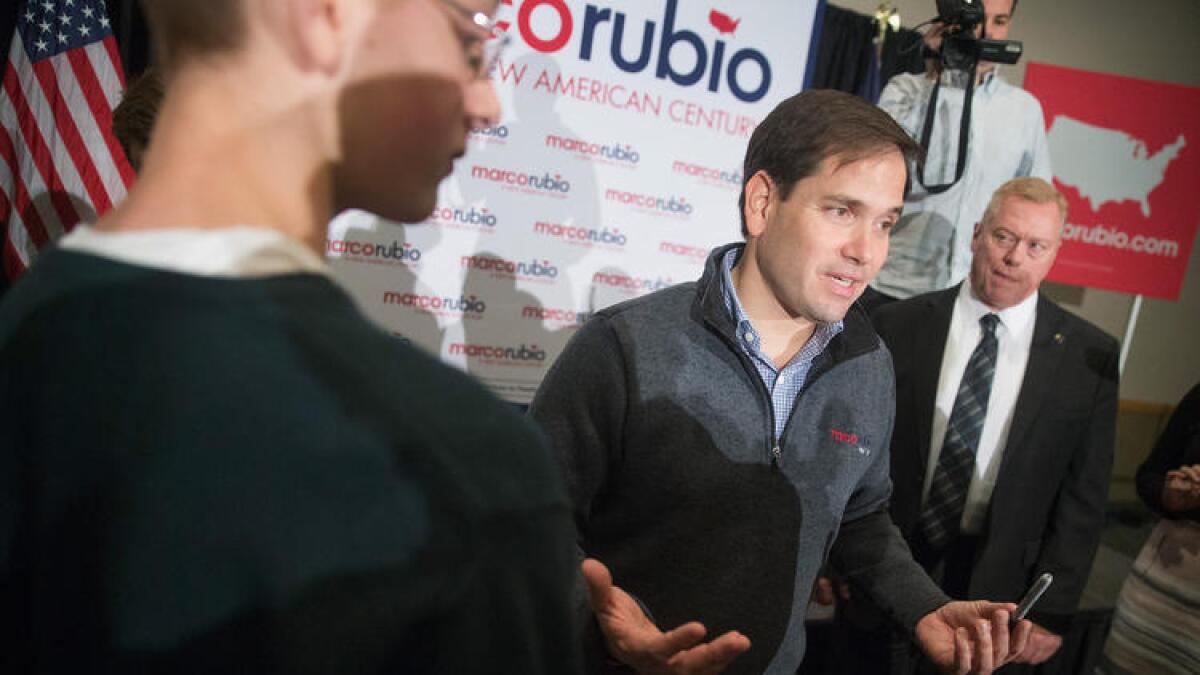
With about two weeks until the first nominating ballots are cast in the 2016 election, the Republican front-runners are battling to cast each other as out of step with conservative voters, and their fight has taken shape over an unexpected topic -- “New York values.”
The discussion gained steam last week when Texas Sen. Ted Cruz accused GOP front-runner Donald Trump of lacking true conservative credentials because he has lived in New York most of his life. Now, Sen. Marco Rubio, who has battled relentlessly with Cruz on immigration, has also waded into the debate as he fights to blunt the momentum of the race’s leaders.
“I’m campaigning on behalf of American values. And I don’t think to divide people against each other,” Rubio said Sunday on NBC’s “Meet the Press.”
He alluded to Cruz being hypocritical, noting that he has raised millions of dollars from New Yorkers.
“He raises money in New York and then criticizes New York values,” Rubio said.
After going after Trump on talk radio, Cruz jabbed him during last week’s debate.
“Everybody understands that the values in New York City are socially liberal and pro-abortion and pro-gay marriage,” he said Thursday. “And focus on money and the media.”
Trump brushed aside the comment, extolling his hometown for its resolve in the wake of the Sept. 11, 2001, attacks.
Amid calls for an apology from some New York elected officials, Cruz offered a half-hearted response.
“I apologize to the millions of New Yorkers who have been let down by the liberal politicians in that state,” he said.
Ted Cruz and Donald Trump join in criticizing the U.S. prisoner swap with Iran
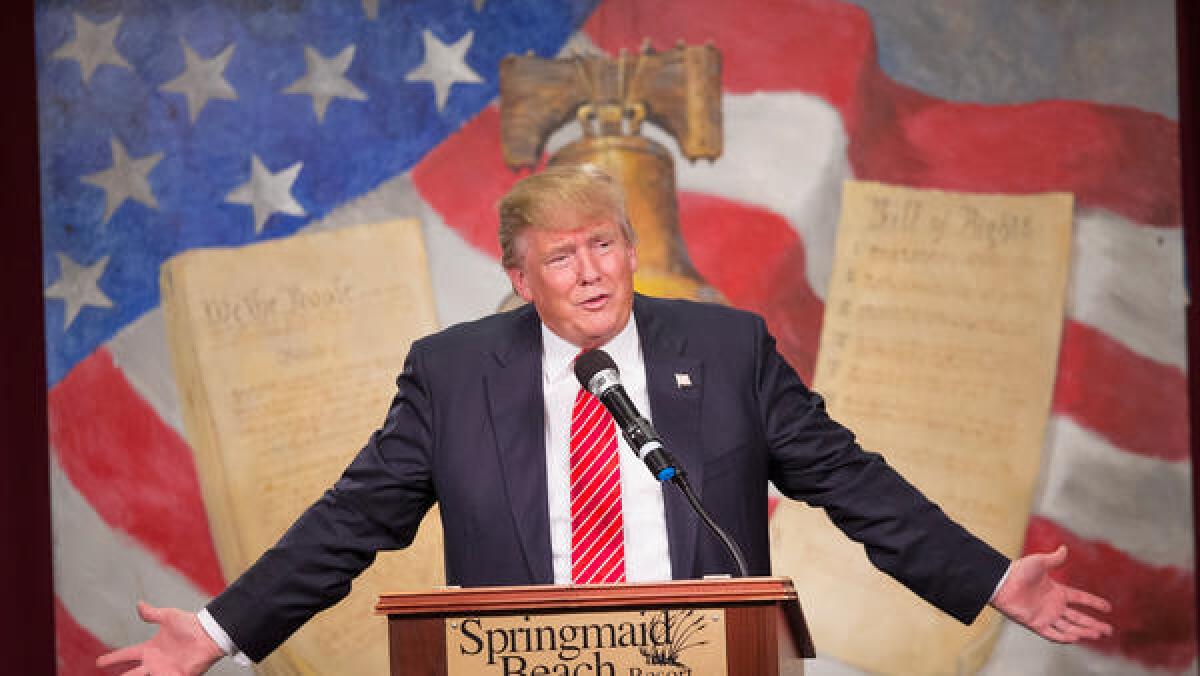
After pillorying each other during the Republican presidential debate two days earlier, front-runners Donald J. Trump and Texas Sen. Ted Cruz toned down the personal attacks and instead joined in criticizing the U.S. prisoner swap with Iran as they sought to highlight their conservative credentials in separate appearances at a tea party convention in South Carolina.
The two candidates, battling each other at the top of the crowded field in the race to win the Iowa caucuses in two weeks, said that they were happy to see the release of four Americans, but that the U.S. had come up short in the deal.
Expect sharp elbows from Clinton and Sanders in last Democratic debate before voting starts
After a succession of Democratic presidential debates largely absent of the acrimony and personal affronts that have defined the GOP face-offs, a sharp turn in tone is expected when the Democratic candidates take the stage in Charleston, S.C., on Sunday night.
A tight race will do that. And Hillary Clinton now finds herself in one in the crucial early states of New Hampshire and Iowa, and Sunday’s debate is a key opportunity for either she or rival Bernie Sanders to reshape the race before the first nominating contests Feb. 1. The debate is the last the Democrats will have before the nation’s first ballots are counted.
Clinton’s approach of running above the fray has fallen short. Instead, she’s in a place the Democratic establishment had not expected her to be: struggling to avoid the embarrassment of losing early states to Sanders, the socialist from Vermont.
In Iowa, Hillary Clinton deploys Bill to win over voters

As Hillary Clinton has seen her lead evaporate in Iowa, and some allies are openly fretting that she could repeat her 2008 loss here, she is deploying one of her most powerful weapons - her husband.
With just more than two weeks before Iowa holds the first nominating contests of 2016, former President Clinton crisscrossed the state for rallies in metropolitan areas and rural outposts, trying to convince voters that his wife is uniquely qualified to be president now because of her experience and mettle.
“If you want to know who can rebuild the economy, deal with the social issues, stop the president’s progress from being repealed and keep the country safe, this is not a close question,” Clinton told several hundred people Saturday evening at a rally at a high school in Des Moines, accompanied by daughter Chelsea.